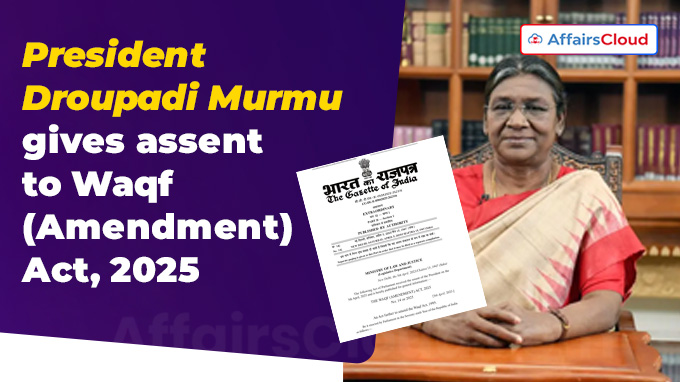 On April 05,2025, President Droupadi Murmu gave her assent to the Waqf (Amendment) Act, 2025. The Bill was passed by Parliament after three days of intense debate in both the Lok Sabha and the Rajya Sabha.
On April 05,2025, President Droupadi Murmu gave her assent to the Waqf (Amendment) Act, 2025. The Bill was passed by Parliament after three days of intense debate in both the Lok Sabha and the Rajya Sabha.
- The objective of the Waqf (Amendment) Act,2025, is to amend the Waqf Act, 1995, to redress the issues and challenges in regulating and managing Waqf properties. The Amendment Act seeks to improve the administration and management of waqf properties in India.
About Waqf:
i.Waqf: It refers to properties dedicated exclusively for religious or charitable purposes under Islamic law, and any other use or sale of the property is prohibited.
- It means that the ownership of the property is now taken away from the person making Waqf and transferred and detained by Allah.
ii.Irrevocable: Once the ownership of the property is transferred to Allah, the property cannot be taken back from Allah, once a property becomes Waqf, it will always stay Waqf, making it irrevocable.
iii.India has the largest waqf holding in the World. Further, Waqf Board is the largest landowner in India after the Armed Forces and the Indian Railways.
Existing Issues:
i.Irrevocability of Waqf Properties: The principle “once a waqf, always a waqf” has led to disputes, such as claims over islands in Bet Dwarka.
ii.Legal Disputes & Poor Management: The Waqf Act, 1995, along with its 2013 amendment, has not been effective, as several problems still persist such as illegal land occupation, mismanagement, ownership disputes, delays in registration and surveys and a surge in litigation and complaints to the Ministry
iii.No Judicial Oversight: Waqf tribunal decisions cannot be appealed in higher courts, limiting transparency and accountability in Waqf management.
iv.Incomplete survey of Waqf properties: Poor performance by the survey commissioner has caused delays, with surveys yet to begin in Gujarat and Uttarakhand, and a 2014 survey in Uttar Pradesh still pending.
v.Misuse: Some state Waqf boards have misused their powers, creating community tensions. Section 40 of the Waqf Act has been widely misused to declare private properties as Waqf, leading to legal disputes.
Key features of the Waqf (amendment):
The Waqf (Amendment) Act, 2025 aims to streamline the management of Waqf properties, with provisions to safeguard heritage sites and promote social welfare. Following are the various amendments made:
i.Government property as Waqf: Any property belonging to the government that is designated as Waqf shall cease to be recognized as Waqf.
- In the event of an ownership dispute, the Collector shall investigate the matter and submit a comprehensive report to the state government for resolution
ii.Central Waqf Council Composition:
- At least two members of the Council must be non-Muslims.
- Members of Parliament, former judges, and other eminent persons appointed under the provisions of the Act are not required to be Muslims.
- The following categories of members must be Muslims:
Representatives of Muslim organizations, Scholars specializing in Islamic law and Chairpersons of State Waqf Boards.
- Among the Muslim members, a minimum of two must be women.
iii.Waqf Boards Composition:
- At least two members must be non-Muslims.
- There must be at least one member each from the Shia, Sunni, and Backward Class Muslim communities.
- If Waqf properties belonging to the Bohra and Agakhani communities exist within the state, one member from each of these communities must be included.
- A minimum of two Muslim members of the Board must be women.
iv.Tribunal Composition: The amendment removes the Muslim law expert and instead includes:
- A current or former District Court judge as chairman.
- A current or former joint secretary to the state government
v.Powers of Central Government:
- The Act authorizes the Central Government to frame rules concerning the registration of waqf properties, the publication of their financial accounts, and the disclosure of proceedings of Waqf Board.
- It also empowers the Central Government to initiate audits of these records through the Comptroller and Auditor General (CAG) or any officer designated for the purpose.




